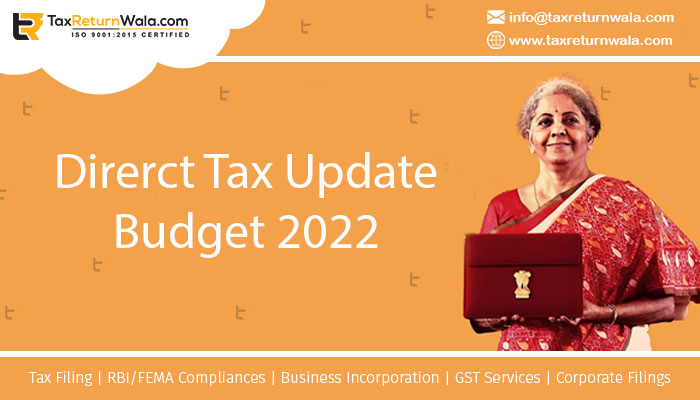Direct Tax Update: Budget 2022
- File updated ITR till two years:
Finance Minister Smt. Nirmala Sitharaman has announced newly updated return rules. Taxpayers can now file an updated ITR within 2 years of the relevant assessment year on payment of additional tax. This gives taxpayers an opportunity to file the updated ITR to the TaxPayers who missed filing their income tax return completely and misses some incomes. Hence, the government is giving an opportunity to the taxpayers to update their omitted incomes. The Finance Minister said that this is being done with the intent to establish a more trustworthy tax regime that will further simplify the tax system, promote voluntary compliance by taxpayers, and reduce litigation.
- Health and education cess clarifications:
Health and education cess is not a business expenditure and it cannot be allowed as a business expense while computing the total income. This includes tax and surcharges. This has been clarified that any surcharge or cess on income and profits is not allowable as business expenditure. This clarification shall overpower the orders passed under any case law on the subject.
- National Pension System:
(Benefit for Government Employees)
The tax deduction limit for state government employees’ contribution to NPS (Tier-1) was raised to 14% from 10%. This has been done to provide equal treatment to both Central and State government employees.
This would help in enhancing the social security benefits of the state government employees and bring them at par with central government employees, said the minister.
- Startup Incentives:
Eligible startups established before 31.03.2022 have been provided a tax incentive for three consecutive years out of ten years from incorporation. Due to the Covid pandemic, the period of incorporation of eligible startups has been extended by one more year i.e., up to 31.03.2023.
- New Manufacturing unit incentives:
To opt for a Concessional tax rate under sec 115BAB, the period has been extended by one year is from 31.03.2023 to 31.03.2024.
- Reduced Alternate Minimum tax rate and Surcharge for cooperatives:
To provide a level playing field between co-operatives societies and companies, the Alternate minimum tax rate for cooperative societies has been reduced to 15% from 18.5%.
Also, a surcharge on cooperative societies has been reduced to 7% from 12% for those having a total income of more than Rs 1 crore and up to Rs 10 crore.
This would help in enhancing the income of cooperative societies and their members who are mostly from rural and farming communities, said the minister.
- Tax reliefs to a person with a disability:
The payment of annuity and lump sum amount to the differently-abled dependents during the lifetime of parents/guardians will be allowed, i.e., on parents/guardians attaining the age of sixty years.
Presently, it was allowed only if the payment of the annuity or lump sum amount has been made for the benefit of the dependent, being a person with a disability, in the event of the death of the individual.
- Rationalization of surcharge:
The surcharge has been capped at 15% for the AOP as presently the income of these AOPs has to suffer a graded surcharge up to 37% which is very high.
- Deterrence against tax evasion:
No set-off, of any losses, shall be allowed against undisclosed income detected during search and survey operations. It has been done to bring certainty and to increase deterrence among tax evaders.
- Tax incentives to IFSC:
Income of a non-resident from offshore derivative instruments, or over-the-counter derivatives issued by an offshore banking unit, income from royalty and interest on account of lease of the ship, and income received from portfolio management services in IFSC shall be exempt from tax, subject to specified conditions.
11. No repetitive appeals for the common question of laws.
12. Central Government has the power to issue guidelines for removing difficulties that may
be faced by taxpayers and authorities in regard to TDS. It is also stated that the taxpayer is to
be responsible for ensuring that the required tax to be deducted has been paid.
13. Finance Bill has extended the time limit for completing the assessment proceedings for
the Assessment Year (AY) 2020-21 to 30 September 2022 instead of 31 March 2022.
For more on Taxes and Compliances
Write to us at info@taxreturnwala.com


